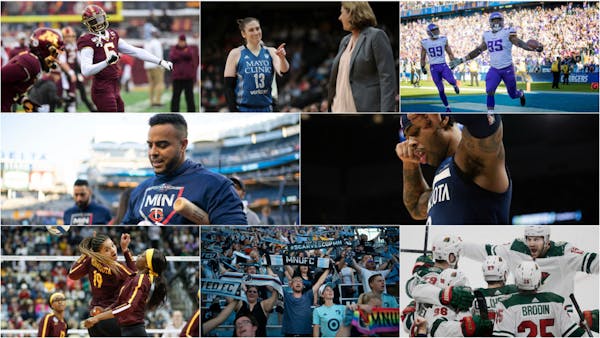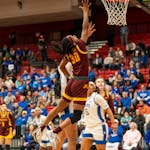Every fall weekend since Darrell Thompson was 9 years old, there has been one constant.
Football.
Whether it was playing Fridays at Rochester John Marshall, Saturdays for the Gophers or Sundays with the Green Bay Packers. Or watching his kids play, including Gophers receiver True Thompson. Or broadcasting games as the Gophers radio analyst.
Now a huge component of that — the Big Ten college season — is missing.
"Even when we had a bye, I'd be like, 'Oh, let me watch Wisconsin or let me watch someone because we're going to play them in two weeks,' " Thompson said. " … But [to] have no horse in any fight is going to be strange and to have the Saturday off and not have very much to do or to look forward to is an odd time in our society and country.
"And I'm sure there's tons of guys like me."
The Gophers were supposed to start their 2020 season Thursday against Florida Atlantic, a much-anticipated follow-up to an 11-2 season with almost the entirety of a historically productive offense returning. But those nonconference games were the first domino to fall in July, about a month before the Big Ten canceled its fall sports outright, with only hopes of playing a makeup season in the spring.
Turmoil has permeated the U.S. the past six months, causing confusion and disappointment at every new turn. The coronavirus pandemic. The police killing of George Floyd in Minneapolis sparking another civil rights movement. A looming November presidential election that has brought both of those issues into acute focus.
And college football has felt all of it.
When the sports world basically shut down in early March, the Gophers and many other college programs saw their spring football practices evaporate. Suddenly an age-old schedule — from the spring game to summer workouts to August training camp to starting a new season — was in jeopardy.
And while many were initially optimistic the pandemic couldn't possibly last into the fall and take away one of America's favorite sports, and that a few altered practices or increased precautions would be sufficient, the worst-case scenario unfolded.
For the Gophers, that started with reigning Big Ten Receiver of the Year Rashod Bateman opting out of the fall season to focus on the NFL draft. He's stuck to his decision, unlike the Big Ten, which particularly has struggled to see through a course of action.
The conference announced its revised fall football schedules of 10 conference games Aug. 5 only to cancel the season Aug. 11. Since then, the conference reportedly has entertained plans to start play at indoor facilities in January 2021 or possibly as early as Thanksgiving. On Tuesday, President Donald Trump and Big Ten Commissioner Kevin Warren discussed ways to potentially "immediately" start the season.
Without games this fall, athletics departments will lose enormous revenue, including the Gophers' estimated losses at $75 million. And with some football conferences forging ahead — the SEC, ACC and Big 12 among them — how schools will handle championships, player eligibility and scholarships, and more opt-outs for April's NFL draft, are still unknown.
Gophers quarterback Tanner Morgan said Aug. 17 his team has been open about dealing with the emotional side of all this crisis.
"I was a little sad because I wanted to play football. It's what I love to do. It's what I've done since I was 6 years old, football in the fall. That's just what I've been accustomed to," Morgan said. "And there's been a lot of things in my life that haven't been very certain in the past couple of months."
Yet through all of the adversity, college football players have been finding their voices more than ever. Gophers players Seth Green, Brevyn Spann-Ford and others protested in the wake of Floyd's killing and were vocal on social media about ending racial injustice. Teammate Benjamin St-Juste helped form College Athlete Unity, a group that penned an open letter on behalf of Big Ten athletes to demand better safety practices for playing in the COVID-19 era. College football players across the country have started the process of putting together a players association in an effort to have more involvement in NCAA and conference decisionmaking.
All this coming together when social distancing has made it hard to share space. And that gap could still widen this fall, with fans unable to tailgate, teams not allowed to play, Thompson not making his usual rounds around the TCF Bank Stadium press box to catch up with colleagues and friends.
No Big Ten football this fall spells missed opportunities. Not just for making money or winning games, but for players such as True Thompson, who had a chance to fight for two open starting receiver spots. For college athletes to use their national TV platform to show their power and spread their message.
But it does present some new prospects. With three months of Saturdays no longer booked for Big Ten games, there's more time for good. Thompson wondered if the Gophers, for example, might spend the three hours a game would take to instead clean up a park or help out at a Twin Cities charity. Maybe fans will have more mental capacity to think about how they can make change for the better. At the very least, the Gophers have a couple extra months to make their team even stronger.
"There's got to be something we can do," Thompson said, "besides just be deflated because we can't play football."
Note
• Gophers offensive lineman Curtis Dunlap Jr. has removed his name from the NCAA transfer portal, a source confirmed Wednesday. Dunlap, a Jacksonville, Fla., native, had tweeted Tuesday that he wanted to be closer to home. He was an honorable mention All-Big Ten selection for the Gophers last season as a redshirt freshman.
![An empty TCF Bank Stadium, home of the University of Minnesota Gophers, was photographed Thursday, Aug. 13, 2020 in Minneapolis, Minn. ] aaron.lavinsk](https://arc.stimg.co/startribunemedia/ETY5UWZWX2KKZQDG2GT4F4NDHQ.jpg?fit=crop&crop=faces&w=550&&auto=format)




